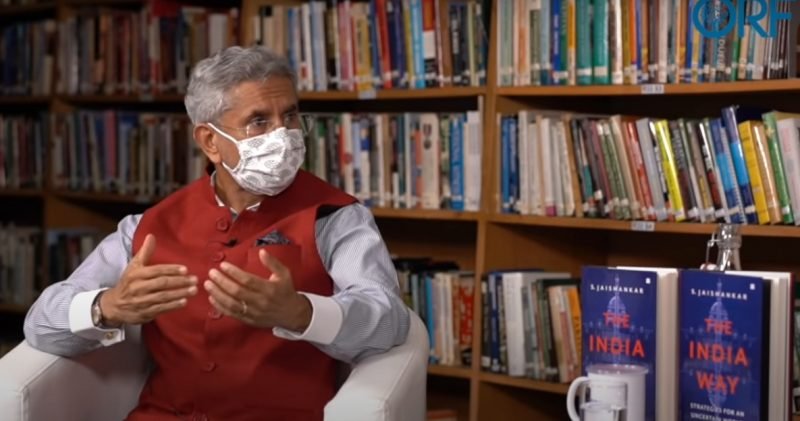Virtual launch of Indian External Affairs Minister’s new book “The India Way”

The much-awaited book launch of the External Affairs Minister of India, Dr S Jaishankar was virtually held on the 3rd of September 2020 in partnership with the Observer Research Foundation. The book titled “THE INDIA WAY: Strategies for an uncertain world” garnered wide appreciation from various diplomats and leaders worldwide with messages pouring in to congratulate the minister on the successful release of the book.
Starting from a message from the Minister of Foreign Affairs, Australia Marise Payne, she emphasised on the growing relationship between India and Australia especially post the Covid-19 times and as a block against a rising China with a strong strategic partnership. Exchange of opportunities from trade, education, investment, military exercises have all had a positive effect in strengthening the bilateral ties between India and Australia. Next, Mohamed Nasheed, the former President of Maldives spoke about his strong friendship with the Indian minister and expressed his praise for the book. He promised to hold talks to further collaborations on world issues like Climate Change, maritime cooperation as well as a support for India against China. The Minister for Foreign Affairs, Singapore, Vivian Balakrishnan started his message with condolences for the demise of late former President of India Pranab Mukharjee and later described his learning out of the book and how the book helped him view India with a new perspective.
EAM Dr S. Jaishankar gave a gist about what to expect from the book. The book, according to him would give a good insight into the changing nature of geopolitics around the world and how India has attempted to adapt to such a dynamic world which evolves constantly. One of the main changes that he has observed over the last few years was the shift in the US policy which has had a strong impact on the world. The position of the United States on multilateralism and utility derived from Alliances has drastically shifted which has led to a culture of substantial disruption in the global order. Another thing highlighted by him was that the real assumptions of how the world works have also changed with a transformation in the nature of power from a military-driven dominance to softer power balance with focus on connectivity, technology, trade and investment and a shared sense of ethics and morality. These very changes were the inspiration for the minister to write a book to assimilate various ideas and strategies for India to deal with the dynamism around it through its foreign policy.

In today’s globalised world, the stress on a powerful foreign policy cannot be understated because the world today runs on alliances and mutual benefits; the times of a zero-sum game has gone. And with such rapid transfiguration in the global structure, it is imperative to be accommodative to change and cultivate an open perspective. Another major change in the global order, as observed by the EAM was the rising power of China. The velocity with which this rise is occurring as been beyond the comprehension of most countries around the world. And he even emphasised that India and China are probably the two civilisations who would enter the 4th stage of Industrial evolution with a major focus on technology and entrepreneurship. And hence, it is important for both the countries to reach a middle ground regarding the disagreements that they face and work together towards a positive future.
A few other foreign ministers from the UK, Canada and Sweden also expressed their amusement on reading the book and shared their ideas and perceptions about India. All of them recognised the fact that India has been playing an increasing role in the international orientation today and being a centre for such a rich culture and a democratic home to more than a billion people in the world, India has strategically become important as a rising global leader, more so in the context of an uncontrollable rise of China. The minster towards the end also spoke about why ethics play a crucial part in defining the foreign policy of any country because they are deeply entrenched with the value systems that the country is subject to. And holding on to such values help in the long term to make strong and genuine alliances without any compromise on an ideology that is dear to our country. Earlier during the Cold War era, most countries compromised their intrinsic values for momentary benefits from alliances. Ethics, therefore, become much more relevant today even simply for a reason that whenever a policy confusion arises, referring back to ethics almost instantaneously provides for a solution. He also acknowledged that the people of the world have started viewing Indians differently, with today India being recognised for being a tech-friendly and entrepreneurial culture in Indian society. India has been at the forefront of technological expansion by being one of the few countries who provided assistance to other countries amidst the Pandemic using digital technology. Also being called the pharmacy of the world, India is increasingly being cited in the global context as an important player in helping come out of the pandemic. He concluded that with a collective change in the perspective about India, it has a strong chance of being one of the key conductors of the world affairs in the near future.
















